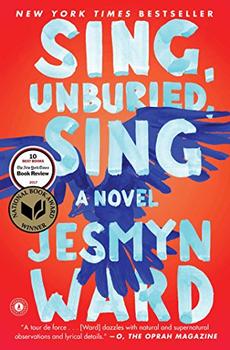Summary | Excerpt | Reading Guide | Reviews | Beyond the book | Read-Alikes | Genres & Themes | Author Bio

A searing and profound Southern odyssey by National Book Award winner Jesmyn Ward.
In Jesmyn Ward's first novel since her National Book Award–winning Salvage the Bones, this singular American writer brings the archetypal road novel into rural twenty-first-century America. Drawing on Morrison and Faulkner, The Odyssey and the Old Testament, Ward gives us an epochal story, a journey through Mississippi's past and present that is both an intimate portrait of a family and an epic tale of hope and struggle. Ward is a major American writer, multiply awarded and universally lauded, and in Sing, Unburied, Sing she is at the height of her powers.
Jojo and his toddler sister, Kayla, live with their grandparents, Mam and Pop, and the occasional presence of their drug-addicted mother, Leonie, on a farm on the Gulf Coast of Mississippi. Leonie is simultaneously tormented and comforted by visions of her dead brother, which only come to her when she's high; Mam is dying of cancer; and quiet, steady Pop tries to run the household and teach Jojo how to be a man. When the white father of Leonie's children is released from prison, she packs her kids and a friend into her car and sets out across the state for Parchman farm, the Mississippi State Penitentiary, on a journey rife with danger and promise.
Sing, Unburied, Sing grapples with the ugly truths at the heart of the American story and the power, and limitations, of the bonds of family. Rich with Ward's distinctive, musical language, Sing, Unburied, Sing is a majestic new work and an essential contribution to American literature.
"Watching the family grabs me inside, twists, and pulls tight. It hurts. It hurts so much I can't look at it," Richie once says. The same could be said of the reader as misery after misfortune seems to pile on thick for Jojo and his loved ones. Yet despite their trying circumstances, the novel is nowhere near bleak. In fact, just as the title promises, it sings — the ghosts and the cast of characters together create a beautiful and haunting melody, one that resonates long after the last page is turned...continued
Full Review
 (680 words)
(680 words)
(Reviewed by Poornima Apte).
 In Sing, Unburied, Sing, Pop serves time at the notorious Parchman prison in Mississippi, the maximum security state penitentiary. While a prisoner, he toils in the cotton fields. "I'd worked, but never like that," he recalls. "Never sunup to sundown in no cotton field. Never in that kind of heat. It's different up there. The heat. Ain't no water to catch the wind and cool you off, so the heat settles and bakes. Like a wet oven."
In Sing, Unburied, Sing, Pop serves time at the notorious Parchman prison in Mississippi, the maximum security state penitentiary. While a prisoner, he toils in the cotton fields. "I'd worked, but never like that," he recalls. "Never sunup to sundown in no cotton field. Never in that kind of heat. It's different up there. The heat. Ain't no water to catch the wind and cool you off, so the heat settles and bakes. Like a wet oven."
If this sounds like slavery that's because it essentially is. And while slavery was declared unconstitutional in the United States in 1865, with the Thirteenth Amendment to the Constitution, a small but significant exception paved the way for prisoners to be used as free labor. "Neither slavery nor involuntary ...

If you liked Sing, Unburied, Sing, try these:

by Elizabeth Gonzalez James
Published 2025
A dazzling magical realism western in the vein of Cormac McCarthy meets Gabriel García Márquez, The Bullet Swallower follows a Mexican bandido as he sets off for Texas to save his family, only to encounter a mysterious figure who has come, finally, to collect a cosmic debt generations in the making.

by Terah Shelton Harris
Published 2024
An explosive and emotional story of four siblings―each fighting their own personal battle―who return home in the wake of their father's death in order to save their family's home from being sold out from under them, from the author of One Summer in Savannah.
Read the best books first, or you may not have a chance to read them at all.
Click Here to find out who said this, as well as discovering other famous literary quotes!